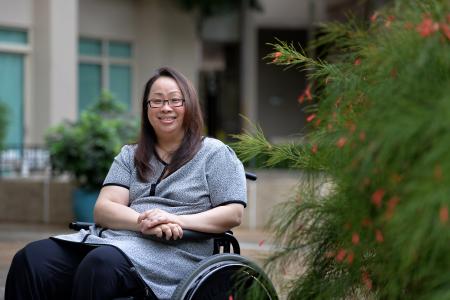Paralysed in car accident, called cripple: Woman survives adversity and depression
Ms June Hoo admits depression could have taken over her life.
In 1996, a bad car accident in the US left her paralysed from the neck down, but she painstakingly clawed her way out of it by thinking about her two kids, who were very young at the time.
But it was almost derailed when her marriage fell apart and her parents objected to the decision to get a divorce.
Ms Hoo recalls: "I refused to cry all along, but I broke down when I heard them say that I needed to stay in the marriage."
Never mind his faults, they said.
"They argued that in my vulnerable situation, I could not possibly take care of myself and the children."
DETERMINATION
Instead of letting everything go south, Ms Hoo became more determined to show that she can take care of her family by herself.
And that meant letting go of some relationships.
She believes someone close to her wished she had died.
Upon some probing, she reveals that she found out after reading a text message on a phone, which said: "Let her die."
The 51-year-old communications consultant tells The New Paper on Sunday: "I needed to take control of my life."
And that included ending bad relationships and getting a divorce.
"Having survived a horrendous car accident and stared death in the face another two times, I believed I could overcome that too."
SURVIVAL
In 1996, Ms Hoo was a corporate high-flier at a multinational company. The family had relocated to the US to be near her husband and she joined the company thereafter. Soon, she started climbing up the ranks.
Then came the crash.
"I was working in Michigan and had to travel to Canada to meet colleagues. I was driving in a rental car towards the border that day," she recalls.
"I was told by passers-by who stopped to help that the car flipped three times before coming to a stop on its back, on the right bank of the highway."
She fractured her spine near the neck. Her heart also stopped once while she was in the intensive care unit, and another time, she developed a blood clot that risked going to her heart and lung and killing her.
"My thoughts went to my children. Samantha was only three and Jonathan had just turned one. They still needed me so I told myself that I cannot die," she recounts.
For the next five months, Ms Hoo went through intensive rehabilitation and eventually regained the use of her arms, right hand and left thumb.
She says that was one of the hardest periods of her life and depression almost swallowed her.
"The therapist and the volunteers didn't allow me to feel sorry for myself. They took me to church service, which was held in the hospital's conference room. They took me to dinner, a symphonic concert and to a talk given by Christopher Reeve," she says, expressing how grateful she is to all of them till this day.
NEW BLOW
The marriage was already suffering when Ms Hoo's family relocated back to Singapore a year after her accident.
Her husband started work immediately and soon began travelling frequently in the region.
Ms Hoo also returned to work - she learnt how to type with her right hand and her company gave her first a part-time role and later, a global communications position.
Then came another blow - she began to feel like her husband neither loved her nor cared if she lived or died.
There were also text messages referring to her as a cripple from someone close to her. She knew then they had to part ways. She also got a divorce in 2007.
TRIUMPH
Now a single parent, Ms Hoo was determined to keep going. She worked her heart out to earn enough money to get a place to live, and her salary was sufficient to raise her two kids.
Their father helped with maintenance payments and today, her kids, aged 21 and 19, are both in school.
Ms Hoo also played a part in improving the transportation options for the disabled here, working with various Land Transport Authority focus groups when they initially wanted to do away with London cabs.
Eventually, there was a $3 million grant from the Government to keep this option available for disabled commuters.
Ms Hoo suffered another blow when she lost her job a few days before Christmas in 2012. But instead of letting it get to her, she set up a communications consultancy taking on freelance work.
She says: "Always surround yourself with happy people who encourage you to go forward and not look back. This way, you will not wallow in the past and learn to move forward, a step at a time."
"How could I continue a relationship with someone who wanted me dead?"
-Ms June Hoo on ending a relationship with someone close to her
Get The New Paper on your phone with the free TNP app. Download from the Apple App Store or Google Play Store now


